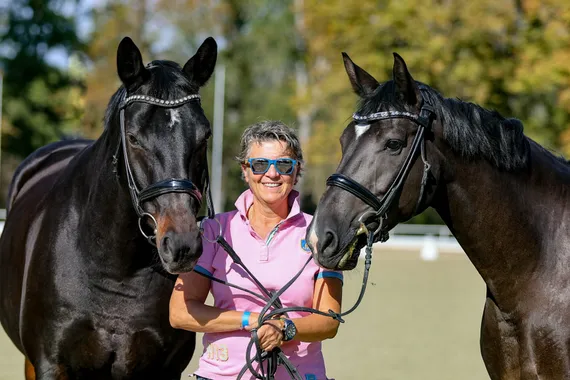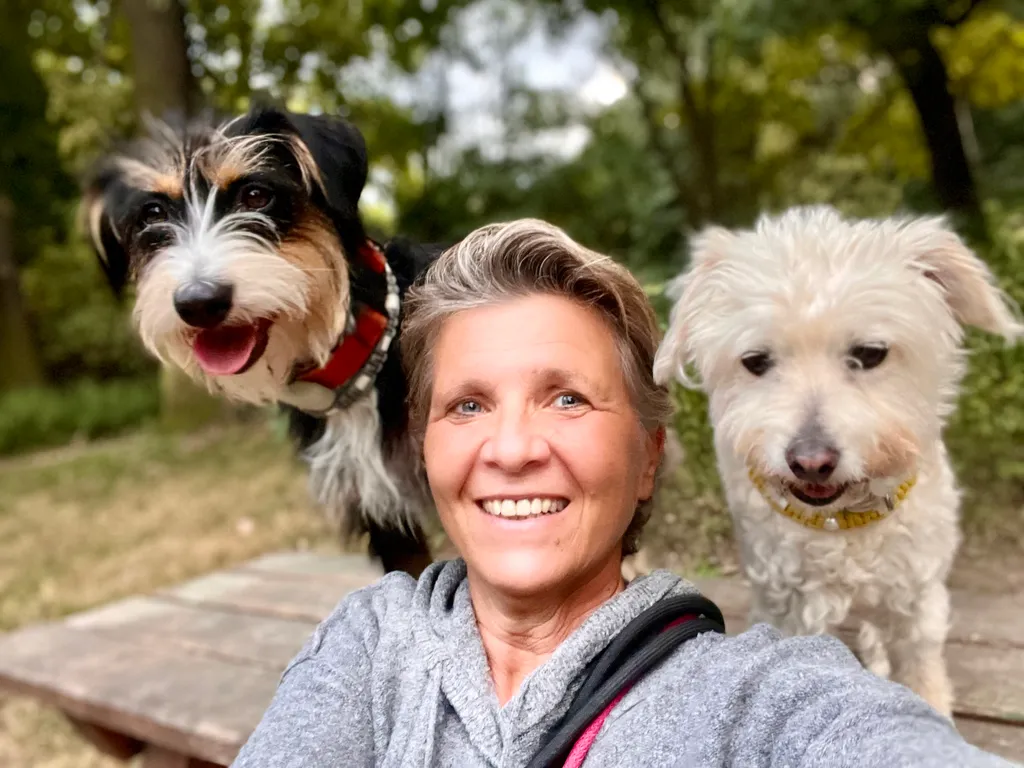
„I accept whatever life throws at me and look forward to tomorrow every day."
The #believeinyourself story of Birgit Payer
Birgit Payer has been with Erste for 37 years, many of them as an HR Business Partner across multiple departments. An avid equestrian, Birgit has recently been confronted with a challenging health diagnosis, which she faces with humility and positivity.

What was your #believeinyourself moment?
I’ve had quite a few #believeinyourself moments lately, but I’d like to tell you about two particular defining moments that happened in the last few years.
During a routine health check-up, a colonoscopy revealed a tumour. “This is just an episode in your life”, my doctor assured me, assuming that the issue could be solved with surgery. After the tumour was removed, I had chemotherapy, which was successful. It seemed that I was cured and I felt profoundly relieved.
But two years later, the doctors discovered metastases in my liver and diaphragm during a follow-up visit. I was shocked. Had the initial tumour been more than “just an episode”? Had I done everything right back then? What was going to happen now? With responsibilities as an HR business partner, how would I break this news to my manager and team? Was my dream of competing in horse shows again now entirely unattainable?
What did you do?
I felt that I had to confront the situation head-on. There was no way around it. I had a great doctor who saw me through surgeries and chemotherapies. I also explored alternative healing methods and sought psychotherapeutic support. Despite many moments of doubt and having to deal with the realisation of my own mortality, my resolve to live and embrace life again never gave in to the disease or treatments. But I also knew that a challenging journey lay ahead of me.


Where did you find strength during this challenging time?
The support from my partner and my family gave me a lot of strength. And the companionship of my animals – two dogs, two tomcats and a pair of horses – offered a welcome diversion.
In the workplace, the empathy and understanding of my colleagues and my manager were instrumental in my recovery. They gave me the time I needed, and the regular, informal communication with them gave me a sense of confidence, reinforcing my conviction that I would be able to make a successful comeback.
How did you navigate the return to your personal and professional life?
After I had recovered from the surgeries and chemotherapies and was considered “cured”, I was physically weak but very relieved. I knew that regular follow-ups were going to be my new normal and that the spectre of relapse would always be looming in the background. But my enthusiasm for life had returned, propelling me forward with fresh ambitions – one step at a time.
When I felt ready to return to work, I participated in Erste Bank’s reintegration programme, receiving exceptional and empathetic support from the Health Centre. Gradually, my life returned to normal. I was able to resume some of my office duties with significant support from my team. Over time, I took on more responsibilities, which made me feel needed and gave me strength.
Where did you find strength during this challenging time?
The support from my partner and my family gave me a lot of strength. And the companionship of my animals – two dogs, two tomcats and a pair of horses – offered a welcome diversion.
In the workplace, the empathy and understanding of my colleagues and my manager were instrumental in my recovery. They gave me the time I needed, and the regular, informal communication with them gave me a sense of confidence, reinforcing my conviction that I would be able to make a successful comeback.
How did you navigate the return to your personal and professional life?
After I had recovered from the surgeries and chemotherapies and was considered “cured”, I was physically weak but very relieved. I knew that regular follow-ups were going to be my new normal and that the spectre of relapse would always be looming in the background. But my enthusiasm for life had returned, propelling me forward with fresh ambitions – one step at a time.
When I felt ready to return to work, I participated in Erste Bank’s reintegration programme, receiving exceptional and empathetic support from the Health Centre. Gradually, my life returned to normal. I was able to resume some of my office duties with significant support from my team. Over time, I took on more responsibilities, which made me feel needed and gave me strength.

How do you feel now, after overcoming those years of hardship?
I have to say that this journey has made me stronger, offering a new perspective on life’s challenges. And here’s another #believeinyourself moment: I decided to return to dressage competitions – at the highest level, just like before my illness. Despite the physical demands the training placed on me, especially on my breathing, which was impaired by my surgeries, I managed to persevere. And my horse Benigni was also happy that I was back. The two of us managed to compete at Easter this year. I was very happy with our comeback. Experiencing that sense of normalcy again was incredibly fulfilling and motivational.
What form of support from your employer would have made a difference for you during this difficult time?
The Health Centre offered a very professional support system and also provided legal advice on disability status, for example. One thing I wished for was more interaction with colleagues in a similar situation, to share experiences and advice. Should I apply for disability status? How do you personally feel about making such a decision? How do your manager and colleagues view this step? What are the implications within the team?
What would you like to pass on to your colleagues?
First of all, I really urge everyone to have regular health check-ups. I’ve learned to accept whatever life throws at me and make the most of it. The concept of “gratitude” has taken on a new dimension for me.
While colleagues and managers can’t heal you, they can give you the feeling that they are there for you and have your back, allowing you to place your entire focus on recovery.

